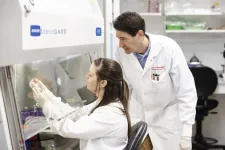(Press-News.org) Including patients as partners for making decisions about their medical treatments is an important aspect of patient-centered care. A new study from England examined choices that patients with breast cancer make when considering where to have surgery for their condition and assessed how policies that offer such choices might affect inequalities in the health care system. The findings are published by Wiley online in CANCER, a peer-reviewed journal of the American Cancer Society.
For the study, investigators analyzed data from the National Health Service (NHS), the publicly funded health care system in the United Kingdom that offers patients with cancer the opportunity to select any hospital providing cancer treatment, and identified all women diagnosed with breast cancer from 2016 to 2018 who had breast-conserving surgery or a mastectomy.
Records showed that 22,622 of 69,153 patients undergoing breast-conserving surgery (32.7%) and 7,179 of 23,536 patients undergoing mastectomy (30.5%) bypassed their nearest hospital to receive surgery farther away from home. Women who were younger, without additional medical conditions, of white ethnic background, or lived in rural areas were more likely to travel to more distant hospitals.
Patients were more likely to be treated at hospitals classified as specialist breast reconstruction centers even if they personally were not undergoing breast reconstruction after surgery. Patients who had a mastectomy and immediate breast reconstruction were more likely to travel to hospitals that had surgeons with a strong media reputation for breast cancer surgery, and patients were less likely to travel to hospitals with shorter surgical waiting times. Patients did not seem to make choices based on hospitals’ research activity, quality rating, breast re-operation rates (to remove additional cancer cells that were missed), or status as a multidisciplinary cancer center (where patients can receive all their care at one location).
The investigators noted that this separation—elderly patients, those with comorbidities, and those from ethnic minority backgrounds receiving care at their local hospital, while others travel to other hospitals and specialist centers—could further drive inequalities in access to quality care.
“As marginalized groups already face barriers to high-quality care, it is important for policy makers to consider measures that mitigate against the risks of increasing inequalities in access and outcomes, by for example providing free transport, accommodation, or even protection against loss of income,” said co-author Lu Han, PhD, of the London School of Hygiene & Tropical Medicine. “Moreover, patients prefer to access information on the quality of breast cancer care of the hospitals in their region at the start of the management pathway when a diagnosis is sought. Such information should be easy to understand and presented in a format that can support the trade-offs that patients have to make.”
Additional information
NOTE: The information contained in this release is protected by copyright. Please include journal attribution in all coverage. A free abstract of this article will be available via the CANCER Newsroom upon online publication. For more information or to obtain a PDF of any study, please contact: Sara Henning-Stout, newsroom@wiley.com
Full Citation:
“Association of travel time, patient characteristics and hospital quality with patient mobility for breast cancer surgery: a national population-based study.” Ajay Aggarwal, Lu Han, Daniel Lewis, Jeanette Costigan, Alison Hubbard, Joanne Taylor, Anne Rigg, Arnie Purushotham, and Jan van der Meulen. CANCER; Published Online: January 8 2024 (DOI: 10.1002/cncr.35153).
URL Upon Publication: http://doi.wiley.com/10.1002/cncr.35153
Author Contact: press@lshtm.ac.uk
About the Journal
CANCER is a peer-reviewed publication of the American Cancer Society integrating scientific information from worldwide sources for all oncologic specialties. The objective of CANCER is to provide an interdisciplinary forum for the exchange of information among oncologic disciplines concerned with the etiology, course, and treatment of human cancer. CANCER is published on behalf of the American Cancer Society by Wiley and can be accessed online. Follow CANCER on Twitter @JournalCancer and Instagram @ACSJournalCancer, and stay up to date with the American Cancer Society Journals on LinkedIn.
About Wiley
Wiley is a knowledge company and a global leader in research, publishing, and knowledge solutions. Dedicated to the creation and application of knowledge, Wiley serves the world’s researchers, learners, innovators, and leaders, helping them achieve their goals and solve the world's most important challenges. For more than two centuries, Wiley has been delivering on its timeless mission to unlock human potential. Visit us at Wiley.com. Follow us on Facebook, Twitter, LinkedIn and Instagram.
END
Where do patients choose to undergo breast cancer surgery, and do these choices drive health care inequality?
Study links certain patient characteristics with the likelihood of bypassing the nearest surgical center for treatment
2024-01-08
ELSE PRESS RELEASES FROM THIS DATE:
Some mosquitoes like it hot
2024-01-08
Certain populations of mosquitoes are more heat tolerant and better equipped to survive heat waves than others, according to new research from Washington University in St. Louis.
This is bad news in a world where vector-borne diseases are an increasingly global health concern. Most models that scientists use to estimate vector-borne disease risk currently assume that mosquito heat tolerances do not vary. As a result, these models may underestimate mosquitoes’ ability to spread diseases in a warming world.
Researchers led by Katie M. Westby, a senior scientist at Tyson Research Center, Washington ...
Out-of-pocket cost increase could put HIV prevention medications out of reach
2024-01-08
PHILADELPHIA – Increasing patients’ out of pocket costs for HIV pre-exposure prophylaxis (PrEP), medications, which have been shown to dramatically reduce the risk of HIV infection, could lead to a significant reduction in PrEP use and a rise in HIV infection rates, according to a new study co-led by researchers at the Perelman School of Medicine at the University of Pennsylvania and Johns Hopkins Bloomberg School of Public Health.
The study, published today in Health Affairs, was designed, in part, to explore the impact that out-of-pocket cost increases could have, depending on the outcome of an ongoing court case challenging certain ...
Survey finds majority of Americans think bariatric surgery is a shortcut to losing pounds, should only be a last resort
2024-01-08
Orlando, Fla - More than two in five U.S. adults suffer from obesity, an epidemic that continues to trend upward. While bariatric surgery is an extremely effective treatment option, a new national survey by Orlando Health reveals common stigmas that may deter those who qualify for surgery from pursuing the treatment they need.
“Treatment plans for obesity are tailored to each individual patient based on things like body mass index and existing medical conditions and may include medication, lifestyle changes, counseling and bariatric surgery,” said Andre Teixeira, MD, medical ...
First ever scientific study on First World War crater reveals new details on its history
2024-01-08
The spectacular explosion of the mine at Hawthorn Ridge – a fortified German front-line position in the First World War – marked the beginning of the Battle of the Somme, and remains one of the best-known pieces of film from the whole conflict.
More than 60ft below the surface, British miners had dug a gallery for more than 900 metres from their lines and packed it with 40,000 lbs of explosives. It was one of 19 mines placed beneath German front positions that were detonated on 1st July, 1916 to mark the start of the offensive.
But the detonation of the ...
Blood flow changes in the eyes could influence visual symptoms of migraines
2024-01-06
A recent study found changes in blood flow in the retina could explain why some migraine patients experience visual symptoms. The findings could represent a long-sought observable marker for migraines that doctors can use to aid in the clinical treatment of the condition.
While patients with migraines often experience symptoms such as pain around the eye, sensitivity to light, blind spots and visual blurring, the mechanisms behind those symptoms have not been well understood. UCLA Health researchers used a non-invasive imaging technique, known as optical coherence tomography angiography, or OCTA, ...
Global scientific network highlights plant genera named for women
2024-01-06
A network of scientists across the globe have identified more than 700 plant genera named for women. This is a nearly twenty-fold increase in the number of genera linked to women before the group started working on the list.
The project, which aimed to highlight the contribution of women to botany, was the result of social media conversations about plants named for people.
What began as a simple question about how many and which plant genera were named for women evolved into a global network of scientists who built ...
UofL researchers are unmasking an old foe’s tricks to thwart new diseases
2024-01-05
When the body encounters bacteria, viruses or harmful substances, its innate immune cells, neutrophils, assemble at the site to combat the invader.
Bacteria and viruses have ways to avoid these defenses, however. Yersinia pestis, the bacteria that causes bubonic and pneumonic plague, for example, can hide from the immune system, allowing it to replicate in the body unhindered until it can overwhelm the host. This ability allowed Y. pestis to spread bubonic plague across Europe in the 14th Century, killing a third of the European population.
While plague may not be a serious threat to human health in modern times, researchers at the University of Louisville are studying Y. ...
Soil fungi may help explain the global gradient in forest diversity
2024-01-05
A paper published in Nature Communications Biology contributes to the growing appreciation for the outsize role that microbes play in everything from human digestion to crop yields: Microbes in the soil—fungi in this case—appear to be influencing forest diversity on a global scale.
Forests on Earth exhibit a marked gradient from the equator toward the poles: Tropical forests near the equator tend to include a large number of different species, whereas forests nearer the poles support less plant diversity.
One explanation for this phenomenon maintains that soil pathogens, including bacteria and fungi, help create this gradient. ...
UC Davis Health creates road map to diversify health care workforce
2024-01-05
How can health care systems increase diversity and inclusion in their workforce?
UC Davis Health, recognized by Forbes as a "Best Employer in California", has developed a road map for increasing workforce diversity across the industry. While California banned the consideration of race or ethnicity in hiring at public institutions in 1996, UC Davis Health has since come up with a holistic outreach and local recruitment plan that has proven effective. And that approach is now receiving global attention through a new case study published in New England Journal ...
PTSD, depression, and anxiety nearly doubles in Israel in aftermath of Hamas attack
2024-01-05
A study conducted by researchers at Ruppin Academic Center in Israel and Columbia University documents the broad impact on the mental health of Israelis, both Jews and Arabs, with sharp increases in post-traumatic stress disorder (PTSD), depression, and anxiety in the aftermath Hamas' attack in October.
The study, published in the Lancet’s EClinicalMedicine Jan. 5, 2023, found the prevalence of probable PTSD, depression, and anxiety in the weeks following the attacks (29% for PTSD, ...
LAST 30 PRESS RELEASES:
New knowledge on heritability paves the way for better treatment of people with chronic inflammatory bowel disease
Under the Lens: Microbiologists Nicola Holden and Gil Domingue weigh in on the raw milk debate
Science reveals why you can’t resist a snack – even when you’re full
Kidney cancer study finds belzutifan plus pembrolizumab post-surgery helps patients at high risk for relapse stay cancer-free longer
Alkali cation effects in electrochemical carbon dioxide reduction
Test platforms for charging wireless cars now fit on a bench
$3 million NIH grant funds national study of Medicare Advantage’s benefit expansion into social supports
Amplified Sciences achieves CAP accreditation for cutting-edge diagnostic lab
Fred Hutch announces 12 recipients of the annual Harold M. Weintraub Graduate Student Award
Native forest litter helps rebuild soil life in post-mining landscapes
Mountain soils in arid regions may emit more greenhouse gas as climate shifts, new study finds
Pairing biochar with other soil amendments could unlock stronger gains in soil health
Why do we get a skip in our step when we’re happy? Thank dopamine
UC Irvine scientists uncover cellular mechanism behind muscle repair
Platform to map living brain noninvasively takes next big step
Stress-testing the Cascadia Subduction Zone reveals variability that could impact how earthquakes spread
We may be underestimating the true carbon cost of northern wildfires
Blood test predicts which bladder cancer patients may safely skip surgery
Kennesaw State's Vijay Anand honored as National Academy of Inventors Senior Member
Recovery from whaling reveals the role of age in Humpback reproduction
Can the canny tick help prevent disease like MS and cancer?
Newcomer children show lower rates of emergency department use for non‑urgent conditions, study finds
Cognitive and neuropsychiatric function in former American football players
From trash to climate tech: rubber gloves find new life as carbon capturers materials
A step towards needed treatments for hantaviruses in new molecular map
Boys are more motivated, while girls are more compassionate?
Study identifies opposing roles for IL6 and IL6R in long-term mortality
AI accurately spots medical disorder from privacy-conscious hand images
Transient Pauli blocking for broadband ultrafast optical switching
Political polarization can spur CO2 emissions, stymie climate action
[Press-News.org] Where do patients choose to undergo breast cancer surgery, and do these choices drive health care inequality?Study links certain patient characteristics with the likelihood of bypassing the nearest surgical center for treatment



